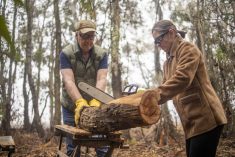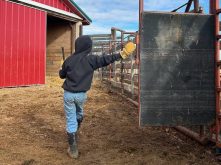The marketing risk management issues I usually write about are focused on improving marketing results while reducing marketing risk. I would say this falls under the category of production management. What I would like to talk about in this article comes under the category of business management: farm transition planning.
You may wonder why I would call this a risk. I would respond by saying that the lack of farm transition planning likely one of the biggest risks many farms face.
I recently attended a local chapter meeting of the Canadian Association of Farm Advisors (CAFA) and sat around a table with accountants, financial advisors, realtors, estate and retirement planners, insurance agents, lenders and transition specialists.
Read Also

Avoid these thought traps when investing
Investing for Fun and Profit: Let’s review a list, by renowned fund manager Peter Lynch, of the most dangerous things that stock market investors can say to themselves, or to others.
The main takeaways I got from this meeting are:
- The vast majority of farm families do not have any kind of a formal written transition plan for their farm.
- Too many farmers believe including a transition plan in their will is sufficient, not realizing the potential tax implications and added family stress this can create.
- To build a complete and effective farm transition plan, you need a collaborative team approach. Include your family and some professionals, including an accountant, a financial advisor, a life insurance representative, a realtor and a lawyer.
We hear often that “farming is big business.” That is true, especially when it comes to the details of transferring or selling property, which can involve taxation law, inheritance law, capital gains or losses, tax credits, divorce and death. It is highly unlikely that any one person has the capacity to understand all of these aspects.
It’s also important to start the process several years in advance of when you anticipate you will need it. At the CAFA meeting, we discussed the importance of getting all generations of the farm family together to discuss the future of the farm. This meeting should include all spouses and siblings, even those that do not live or work on the farm.
Many farm families have meetings and start to discuss transition, but unless they actually write things down and commit to a next meeting, the topic is often left, and eventually dropped all together. It’s easy to do this when you’re busy with the day-to-day operations of a farm.
Make the plan
Transition planning takes commitment and time. That’s why it’s usually best to bring in a transition facilitator who can move the process forward and make sure everyone is engaged and has a say in the outcome. Advisors suggests starting the process at least three to five years before you intend to implement it so there is time to cover off all aspects of the plan and get everyone’s feedback. This way the transition will happen as seamlessly as possible with little disruption to the farm business and few hard feelings between any family members.
One specialist said that 90 per cent of the farm transition plans he works on are done in the hospital at someone’s bedside, which is the worst time to do it. From his experience last minute decisions made under severe stress are not likely to take in to consideration all of the aspects or people the decision might affect. These hospital decisions end up being made with too much emotion and not enough pragmatic thinking.
If you don’t have a transition plan in place and something happens, the farm may need to be sold.
If your plan is to sell your farm at retirement you need to ensure you are transitioning properly to minimize taxes and maximize what you can keep for your retirement and pass on to your family.
I suggest that you start the process for your farm operation now to ensure that you don’t leave it until you are in the hospital. Starting the conversation may not be the easiest thing to do, but it needs to be done now to prevent worse things happening later.
Farming is and always will be a long-term business, a labour of love. For most Prairie farms, that means it’s multi-generational, and the intent is to pass it on to the next generation.
So if you want to ensure the continued success of your family farm get your plan done!
















